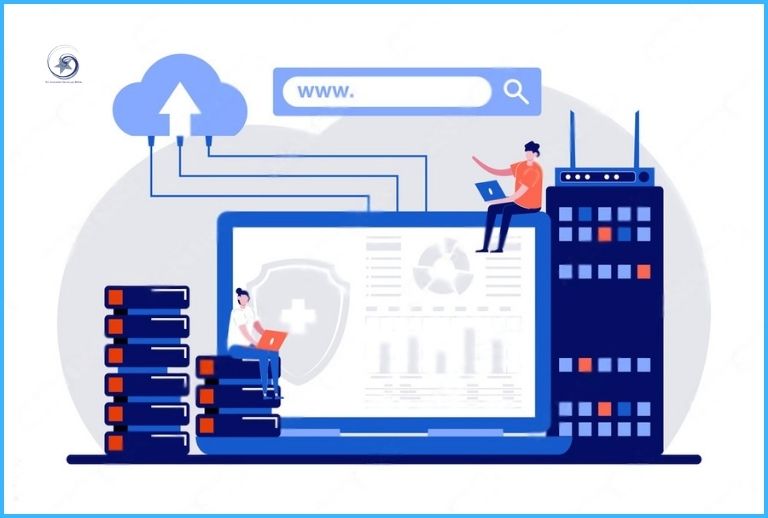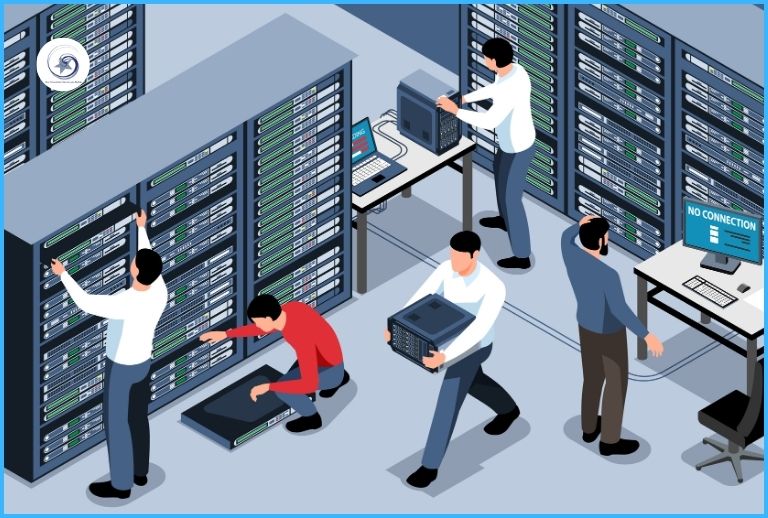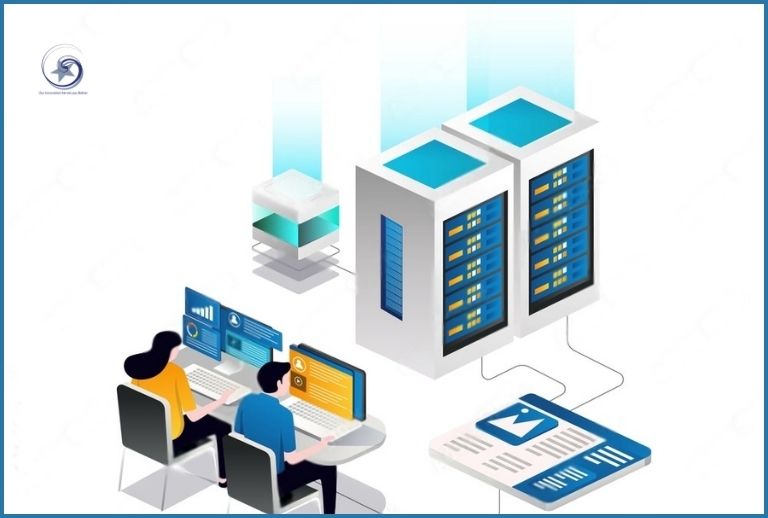Why Choose a Mail Server for Your Business?

Why Choose a Mail Server for Your Business? TABLE OF CONTENTS Why Choose a Mail Server for Your Business? Enhanced Security Improved Reliability Customization and Control Cost Efficiency Enhanced Productivity Professionalism Conclusion Why Choose a Mail Server for Your Business? A reliable mail server is crucial for businesses of all sizes. It ensures secure, efficient, and professional communication, which is essential for maintaining relationships with clients, partners, and employees. Here’s why investing in a dedicated mail server is a wise decision for your business. Features of Mail Servers Enhanced Security: Data Protection: A dedicated mail server employs advanced encryption protocols, safeguarding emails from unauthorized access and breaches. This ensures that sensitive business information, such as financial data, contracts, and personal details, remain secure. Spam and Virus Filtering: With a dedicated mail server, you benefit from comprehensive spam and virus filtering capabilities. These features reduce the risk of malware infections and phishing attacks, protecting your business from potential threats that can compromise your data and operations. Access Control: Implementing strict access controls on a dedicated mail server prevents unauthorized users from accessing your emails. This level of control is crucial for maintaining the integrity and security of your communication. Improved Reliability: Reliability is another critical factor that a dedicated mail server addresses effectively. Uptime Guarantee: Unlike public email services that may experience frequent outages, a dedicated mail server typically offers a higher uptime guarantee. This ensures that your business communication remains uninterrupted, which is essential for maintaining productivity and customer satisfaction. Data Backup: Regular data backups are a standard feature of dedicated mail servers. These backups allow you to recover lost or corrupted data quickly, minimizing downtime and ensuring business continuity. This is particularly important in the event of hardware failures, cyber-attacks, or accidental deletions. Customization and Control A dedicated mail server offers unparalleled customization and control over your email system. Tailored Solutions: You can customize server settings and configurations to meet the specific needs of your business. Whether you require unique email policies, specific security measures, or customized storage solutions, a dedicated mail server can be tailored to fit your requirements. Administrative Control: Complete control over your mail server allows you to manage user accounts, monitor email usage, and enforce email policies. This level of control helps in optimizing performance and ensuring compliance with internal and external regulations. Cost Efficiency While the initial investment in a dedicated mail server may seem substantial, it offers long-term cost benefits. Scalability: Dedicated mail servers are highly scalable, allowing you to adjust resources based on your business growth. This flexibility helps in managing costs effectively as you can scale up or down without incurring unnecessary expenses. Reduced Third-Party Costs: By managing your own mail server, you reduce dependency on third-party email service providers. This can lead to significant cost savings over time, as you avoid recurring subscription fees and other related costs Enhanced Productivity: A dedicated mail server significantly enhances productivity within your organization. Efficient Communication: With a dedicated mail server, emails are delivered promptly and reliably, enhancing communication efficiency. This is crucial for quick decision-making and timely responses, which are vital in today’s competitive business environment. Collaboration Tools: Many dedicated mail servers come with integrated collaboration tools, such as shared calendars, task managers, and address books. These tools facilitate better team collaboration and project management, leading to improved productivity and streamlined workflows. Professionalism: Maintaining a professional image is essential for any business, and a dedicated mail server contributes significantly to this aspect. Branded Email Addresses: Using a dedicated mail server allows you to create custom email addresses with your company’s domain name. This not only enhances your brand’s professional image but also instills trust and credibility with clients and partners. Consistent Performance: A dedicated mail server ensures consistent email performance, contributing to a reliable and professional communication channel. This consistency is crucial for maintaining the confidence of your stakeholders and clients. Conclusion Investing in a mail server for your business is a strategic decision that offers numerous benefits. From enhanced security and reliability to improved productivity and professionalism, a dedicated mail server provides the control and customization needed to support your business’s unique communication needs. It ensures that your business communication is secure, reliable, and efficient, which is essential for maintaining a competitive edge in today’s market. At Sixth Star Tech, we understand the importance of effective communication. Our dedicated and Cloud mail server solutions are designed to meet the specific needs of your business, providing the security, reliability, and control required for success. Join us and elevate your business
What is a Bare Metal Server?

Understanding Bare Metal Servers and Bare Metal Cloud Computing TABLE OF CONTENTS What is a Bare Metal Server? Key Features of Bare Metal Servers Bare Metal Cloud Computing Benefits of Bare Metal Cloud Computing Bare Metal Cloud Hosting Understanding Bare Metal What is a Bare Metal Server? Use Cases for Bare Metal Servers Choosing Between Bare Metal and Virtualized Environments Conclusion What is a Bare Metal Server? A bare metal server is a physical computer that runs dedicated services without the interference of a virtualization layer. Unlike virtual servers that share resources via a hypervisor, bare metal servers offer direct access to the hardware, maximizing performance and reliability. This setup is ideal for applications requiring high computational power and consistent performance. Key Features of Bare Metal Servers High Performance: With no virtualization overhead, bare metal servers provide optimal performance, making them suitable for resource-intensive applications like big data analytics, high-performance computing (HPC), and gaming. Enhanced Security: Because the server is dedicated to a single tenant, there’s no risk of the “noisy neighbor” effect, and security is easier to manage without the shared infrastructure vulnerabilities. Customization: Users have full control over the hardware, allowing for tailored configurations to meet specific requirements. Bare Metal Cloud Computing Bare metal cloud computing combines the benefits of traditional bare metal servers with the scalability and flexibility of cloud services. This model allows businesses to deploy dedicated servers on-demand, ensuring they can handle variable workloads efficiently Benefits: Scalability: Users can scale their infrastructure up or down as needed, similar to virtualized cloud environments, without compromising on performance. Cost-Effectiveness: Pay-as-you-go pricing models in the cloud mean businesses only pay for the resources they use, reducing the costs associated with maintaining on-premises hardware. Rapid Deployment: Bare metal cloud services enable quick provisioning of servers, reducing the time to market for new applications and services. Hybrid Flexibility: Integration with existing cloud services allows for hybrid deployments, combining the power of bare metal with the flexibility of virtualized resources. Bare Metal Cloud Hosting Bare metal cloud hosting refers to the service provided by cloud vendors where clients can rent dedicated servers on a cloud-based platform. This setup offers several advantages: Performance and Reliability: Dedicated hardware ensures consistent performance and high reliability, crucial for mission-critical applications. Isolation: Physical isolation of resources enhances security, making bare metal cloud hosting suitable for industries with stringent compliance requirements, such as finance and healthcare. Customization: Full control over server hardware and software configurations allows businesses to optimize their infrastructure for specific workloads. Understanding Bare Metal The term “bare metal” refers to the direct use of physical hardware without an intervening layer of virtualization. This approach is in contrast to virtualized environments, where multiple virtual machines (VMs) run on a single physical host using a hypervisor. Bare metal solutions provide unparalleled performance, making them ideal for applications that cannot afford the overhead introduced by virtualization. What is a Bare Metal Server? A bare metal server is essentially a single-tenant environment, meaning it is dedicated to a single customer. This exclusivity contrasts with multi-tenant environments typical in shared or virtualized hosting, where multiple customers share the same physical resources. The main advantages of bare metal servers include: Performance: Direct hardware access means no hypervisor overhead, resulting in better performance for intensive tasks. Reliability: Dedicated hardware reduces the risk of hardware failures caused by other tenants. Security: Physical isolation provides enhanced security, protecting sensitive data and applications from potential breaches in a shared environment. Use Cases for Bare Metal Servers Bare metal servers are particularly suited for: Big Data Analytics: High processing power is required to handle large datasets efficiently. High-Performance Computing (HPC): Scientific simulations, financial modeling, and other HPC tasks benefit from the raw power of bare metal servers. Gaming: Online gaming platforms require high performance and low latency, which bare metal servers can provide. Database Management: Large databases demand significant I/O operations, which are optimally supported by bare metal infrastructure. Choosing Between Bare Metal and Virtualized Environments When deciding between bare metal and virtualized environments, consider the following factors: Performance Needs: If your application demands maximum performance with minimal latency, bare metal is the preferable choice. Workload Variability: For applications with highly variable workloads, virtualized environments offer better flexibility and cost efficiency. Security Requirements: Industries with stringent security and compliance needs might favor bare metal for its enhanced physical isolation. Cost Considerations: While bare metal servers offer high performance, they can be more expensive than virtualized servers. Evaluate your budget and performance needs carefully. Conclusion Bare metal servers and bare metal cloud computing provide powerful solutions for businesses requiring high performance, reliability, and security. By combining the raw power of dedicated hardware with the flexibility of cloud services, bare metal cloud hosting offers an optimal environment for a variety of demanding applications. Whether you need to run data-intensive analytics, high-performance computing tasks, or secure databases, understanding the benefits and use cases of bare metal solutions will help you make an informed decision that aligns with your business goals.
The Importance of Backup Storage

The Importance of Data Backup and Storage TABLE OF CONTENTS Ensuring Data Safety with Cloud Solutions Understanding Cloud Backup Benefits of Cloud Backup Storage Online Backup and Storage System Key Features of an Effective Storage and Backup System Choosing the Right Cloud Backup Solution Implementing Cloud Backup for Businesses Cloud Backup for Personal Use Future Trends in Cloud Backup Storage Conclusion Ensuring Data Safety with Cloud Solutions In today’s digital age, safeguarding data is paramount for individuals and businesses alike. The Importance of Data Backup and Storage, increasing reliance on digital information has made effective storage and backup solutions essential. Among the various options available, cloud backup storage stands out as a robust, efficient, and reliable method. This article delves into the world of backup storage, focusing on cloud-based solutions and their benefits. Understanding Cloud Backup Cloud backup, often referred to as online backup, involves storing data on remote servers accessed via the internet. This method contrasts with traditional backup systems that rely on physical media, such as external hard drives or tapes. Cloud backup storage offers numerous advantages, including scalability, accessibility, and security. Benefits of Cloud Backup Storage Scalability: Cloud backup storage solutions can easily scale to meet growing data needs. Whether a small business or a large enterprise, cloud services offer flexible storage plans that can be adjusted as data requirements change. Accessibility: Data stored in the cloud can be accessed from anywhere with an internet connection. This feature is particularly beneficial for businesses with remote workers or multiple locations, ensuring that critical data is always within reach. Security: Cloud providers implement advanced security measures to protect data, including encryption, regular security audits, and redundant storage to prevent data loss. This level of security often surpasses what individual users or businesses can achieve with in-house solutions. Online Backup and Storage System An online backup and storage system integrates backup processes with online storage capabilities, offering a seamless solution for data protection. These systems typically include automated backup schedules, ensuring that data is regularly updated and backed up without manual intervention. This automation reduces the risk of data loss due to human error and ensures that the most recent versions of files are always available Key Features of an Effective Storage and Backup System Automated Backups: Automation simplifies the backup process, ensuring data is consistently and regularly backed up. This feature is crucial for maintaining up-to-date data copies without relying on manual actions. Data Encryption: To protect sensitive information, effective backup systems use encryption during data transfer and storage. Encryption ensures that data is unreadable to unauthorized users, providing an additional layer of security. Redundancy: Redundant storage means that data is stored in multiple locations, reducing the risk of data loss due to hardware failure or other issues. Cloud backup providers typically offer redundancy as a standard feature. Versioning: This feature allows users to access and restore previous versions of files. Versioning is particularly useful for recovering from accidental deletions or data corruption. User-Friendly Interface: A user-friendly interface simplifies the management of backup settings, file restorations, and monitoring of backup status. Intuitive design ensures that users can easily navigate the system and perform necessary tasks without extensive technical knowledge. Choosing the Right Cloud Backup Solution Selecting the appropriate cloud backup storage solution requires considering several factors: Storage Needs: Assess the amount of data that needs to be backed up. Cloud storage providers offer various plans, from limited storage for personal use to extensive options for businesses with large data volumes. Budget: Cost is a significant consideration. While cloud backup solutions can be cost-effective compared to traditional methods, it’s essential to choose a plan that fits the budget without compromising on critical features. Security Features: Evaluate the security measures implemented by the cloud provider. Look for features such as end-to-end encryption, multi-factor authentication, and compliance with data protection regulations. Customer Support: Reliable customer support is crucial, especially in case of data recovery emergencies. Choose a provider known for responsive and effective support services. Compatibility: Ensure the cloud backup solution is compatible with existing systems and applications. Seamless integration minimizes disruptions and simplifies the backup process. Implementing Cloud Backup for Businesses For businesses, implementing a cloud backup and storage system involves several steps: Assessment: Evaluate current data storage and backup practices. Identify critical data that needs regular backups and determine the frequency of backups required. Selection: Choose a cloud backup provider that meets the business’s needs. Consider factors such as scalability, security, cost, and customer support. Integration: Integrate the cloud backup solution with existing IT infrastructure. Ensure that data transfer is efficient and that the backup process does not interfere with daily operations. Training: Train employees on the new backup system. Ensure they understand how to access and restore data and the importance of adhering to backup schedules. Monitoring: Regularly monitor the backup process to ensure data is being correctly and consistently backed up. Use tools provided by the cloud service to track backup status and address any issues promptly. Cloud Backup for Personal Use Individuals can also benefit significantly from cloud backup solutions. Key advantages include: Peace of Mind: Automated backups ensure that personal files, photos, and important documents are safe from accidental loss or damage. Easy Access: Access personal data from any device with an internet connection. This convenience is especially useful for those who travel frequently or use multiple devices. Cost-Effectiveness: Many cloud backup providers offer affordable plans for personal use. Even free options are available with limited storage capacity, making it accessible for everyone. Future Trends in Cloud Backup Storage The future of cloud backup storage is poised for exciting advancements: Artificial Intelligence (AI): AI can optimize backup processes, predict failures, and offer more efficient data management solutions. Increased Security: As cyber threats evolve, cloud providers will continue to enhance security measures, incorporating more sophisticated encryption and authentication methods. Greater Integration: Expect more seamless integration with various platforms and applications, making cloud backups even more user-friendly and efficient. Edge Computing: Combining cloud backup with edge computing will allow
What is a Cloud Server?

What is a cloud server ? TABLE OF CONTENTS What is a Cloud Server? Cloud Server Meaning Key Features of Cloud Servers Benefits of Using Cloud Servers Use Cases for Cloud Servers Conclusion What is a cloud server? Have you ever cam across a phrase what is a cloud server ? you may come across when someone asking what is a cloud server ? and you heard the answer like it is a virtual server that operates in a cloud computing environment. Unlike traditional physical servers, cloud servers are created, hosted, and delivered via a cloud computing platform over the internet. They offer the same functionalities as typical physical servers but are highly scalable and managed by a third-party cloud service provider. Cloud Server Meaning The meaning of a cloud server revolves around the concept of delivering computing services over the internet (the cloud). This model allows for on-demand access to a shared pool of configurable computing resources that can be quickly provisioned and released with minimal management effort or service provider interaction. Key Features of Cloud Servers Scalability: Cloud servers can easily scale up or down based on demand, allowing businesses to manage their resources more effectively and efficiently. Cost-Effective: Operate on a pay-as-you-go model, resulting in significant cost savings. Reliability: Offer higher uptime and reliability compared to traditional servers. Flexibility: Customizable and configurable to meet specific requirements. Accessibility: Can be accessed from anywhere with an internet connection, enabling remote work and collaboration. Benefits of Using Cloud Servers Reduced Hardware Costs: No need to invest in expensive physical hardware. Maintenance and Management: Handled by the cloud service provider, including maintenance, upgrades, and security. Disaster Recovery: Robust disaster recovery options for data safety and continuity. Performance: Typically offer superior performance through optimized resource allocation. Types of Cloud Servers Public Cloud Servers: Hosted by third-party providers and shared across multiple users. Private Cloud Servers: Dedicated servers for a single organization, offering enhanced security and control. Hybrid Cloud Servers: A combination of both public and private clouds, offering the benefits of both environments. Use Cases for Cloud Servers Web Hosting: Ideal for hosting websites due to scalability and reliability. Application Hosting: Provide the necessary infrastructure for deploying and running applications. Data Storage: Secure and scalable storage solutions for data backup and archiving. Development and Testing: Offer an isolated environment for software development and testing. Conclusion Now understood what is a cloud server and how powerful it is ? A cloud server is a powerful and flexible computing solution that leverages the capabilities of cloud computing to deliver scalable, reliable, and cost-effective resources. Understanding the meaning of a cloud server and its benefits can help businesses and individuals make informed decisions about their IT infrastructure needs. As technology continues to evolve, cloud servers are poised to play an increasingly integral role in the digital landscape.
What is Web Development

What Is Web Development and How Does It Work? Web development is the process of creating websites and web applications for the internet. It involves several disciplines, including web design, content creation, programming, and database management. Web development can be broadly divided into three categories: What are the Types of Web Development 1. Front-end Development: This is the part of the website that users interact with. It includes everything the user experiences directly: text, images, sliders, buttons, etc. Front-end developers use languages like HTML, CSS, and JavaScript to build these elements. 2. Back-end Development: This is the server side of a website. It’s everything that happens behind the scenes, such as data storage and retrieval, user authentication, and server logic. Back-end developers work with server-side languages like PHP, Ruby, Python, and databases like MySQL and MongoDB. 3. Full-stack Development: Full-stack developers handle both front-end and back-end development. They have a comprehensive understanding of how web applications work from top to bottom. Key Technologies and Languages HTML (HyperText Markup Language): HTML is the standard markup language for creating web pages. It structures the content on the web. CSS (Cascading Style Sheets): CSS is used to style and layout web pages. It controls the design, colors, fonts, and overall appearance of the site. JavaScript: JavaScript is a programming language that allows you to create dynamically updating content, control multimedia, animate images, and pretty much everything else. Frameworks and Libraries: Tools like React, Angular, and Vue.js (for JavaScript) help developers build complex applications more efficiently. Similarly, Bootstrap is a popular CSS framework that helps in designing responsive websites quickly. Basic Concepts in Web Development Responsive Design: Ensuring your website looks good on all devices (desktops, tablets, and mobile phones) is crucial. Tools like CSS Flexbox and Grid help achieve responsive designs. Version Control: Tools like Git help developers keep track of changes to their code. Platforms like GitHub enable collaboration and version control management. APIs (Application Programming Interfaces): APIs allow different software systems to communicate with each other. Understanding how to use and integrate APIs can greatly enhance the functionality of your web applications. Getting Started with Web Development Set Up Your Environment: Install a code editor like Visual Studio Code or Sublime Text. Ensure you have a web browser for testing (Google Chrome, Firefox). Learn the Basics: Start with HTML and CSS. Build simple web pages and gradually incorporate JavaScript for interactivity. Build Projects: Apply what you’ve learned by building projects. Start small with personal websites or portfolios and then move on to more complex applications. Join a Community: Engage with other developers through forums, social media, and local meetups. Websites like Stack Overflow and GitHub are great places to learn and collaborate. Resources for Learning Web Development Online Courses: Websites like Coursera, Udemy, and freeCodeCamp offer comprehensive courses on web development. Tutorials and Documentation: MDN Web Docs and W3Schools provide excellent tutorials and documentation for web technologies. Books: Consider reading books like “HTML and CSS: Design and Build Websites” by Jon Duckett and “Eloquent JavaScript” by Marijn Haverbeke. Conclusion: Web development is a dynamic and rewarding field. By understanding the basics and continuously building your skills, you can create amazing web applications and open up new career opportunities. Start learning, build projects, and don’t be afraid to experiment. Happy coding!
Why business should choose Web development agencies

Why business should choose Web development agencies In today’s digital age, a strong online presence is crucial for businesses of all sizes. A well-designed and developed website is the cornerstone of this presence, acting as a digital storefront, information hub, and lead generation machine. But building a website that truly meets your needs and goals can be a complex task. This is where web development agencies come in, offering a multitude of benefits that can make them a smart choice for businesses. Here’s why: Expertise and Experience: A Web Development Team, Not Just a Developer: Agencies house a team of specialists – designers, developers, project managers, SEO experts – each with their own expertise. This ensures a holistic approach to your website, considering design, functionality, user experience (UX), and search engine optimization (SEO) from the get-go. 1. Staying Current with Trends: The web development landscape is constantly evolving. Agencies stay updated on the latest trends and technologies, ensuring your website is built with the future in mind and leverages the newest tools for optimal performance. Strategic Planning and Guidance: 1. Defining Your Website’s Goals: Agencies go beyond just building a website. They work with you to understand your business goals, target audience, and desired user experience. This collaborative approach ensures your website is strategically designed to achieve your specific objectives. 2. Custom Solutions vs. Templates Many agencies avoid cookie-cutter templates and focus on crafting custom solutions that fit your brand and target market. This personalized approach creates a website that stands out and reflects your unique value proposition. Efficiency and Time Savings: 1. Focus on Your Core Business: Building a website takes time and resources. Partnering with an agency allows you to focus on your core business activities while they handle the website development process. 2. Project Management and Clear Communication: Agencies excel at project management, keeping the project on track and within budget. They also prioritize clear communication, ensuring you’re informed and involved throughout the development process. Additional Services and Ongoing Support: 1. Content Creation and Marketing Integration: Many agencies offer additional services like content creation, copywriting, and marketing integration, creating a cohesive online presence for your brand. 2. Maintenance and Security: A website requires ongoing maintenance and security updates. Partnering with an agency can ensure your website remains secure, up-to-date, and functioning optimally. Cost-Effectiveness (Long-term): While hiring an web designing agency might seem like a larger initial investment compared to hiring a freelancer, the benefits often outweigh the cost. Agencies deliver a higher quality product, avoid costly mistakes due to lack of experience, and can potentially save you time and resources in the long run. Conclusion: Overall, web development agencies offer a comprehensive solution for businesses seeking a professional and effective online presence. Their expertise, strategic approach, and ongoing support can empower you to leverage the power of the web and achieve your business goals.
What is wordpress?

What is wordpress? WordPress is a cms platform that is used for website development. Nearly 100 million Active across the world. Most of them are small and medium businesses, bloggers, creators etc. Most of the users will have a question about , Really is wordpress user-friendly ? Is WordPress user-friendly? As a wordpress development company in chennai and completed over 500+ projects in wordpress development. We would say “YES” wordpress is completely user friendly. Even if one doesn’t know anything about the development, they can be easily familiar with wordpress. As we said before, WordPress is an excellent platform for small and medium-sized businesses (SMBs) to create and maintain a blog. Here are several ways in which WordPress benefits SMBs: Ease of Use: User-Friendly Interface: WordPress has an intuitive dashboard that makes it easy for anyone to create and manage content, even without technical expertise. Quick Setup: Businesses can get a blog up and running quickly with minimal setup time. Cost-Effective: Free Core Software: This core software is free, making it a cost-effective solution for businesses on a budget. Affordable Hosting and Themes: Numerous affordable hosting options and themes are available, allowing SMBs to keep costs low. SEO-Friendly: Built-In SEO Features: WordPress is designed with SEO in mind, offering features like clean permalink structures, easy metadata management, and responsive design. SEO Plugins: Plugins like Yoast SEO and All in One SEO Pack help optimize content and improve search engine rankings. Note: looking for a Web development company for your project — Connect with our Experience Experts to help you out. Content Management: Easy Content Creation: The Gutenberg editor and classic editor make it easy to create and format content. Scheduling and Drafting: Content can be scheduled for future publication or saved as drafts, allowing for better planning and management. Community and Support: Large Community: A large and active community of developers and users means plenty of resources, tutorials, and support forums are available. Regular Updates: WordPress is regularly updated with new features, improvements, and security patches. Integration with Other Tools: Marketing Tools: Easily integrates with email marketing services (like MailChimp), CRM systems, and social media platforms. E-commerce: Plugins like WooCommerce transform a blog into a full-fledged online store. Security: Security Plugins: Plugins like Wordfence and Sucuri Security help protect the site from threats. Regular Updates: Regular updates ensure the platform stays secure against vulnerabilities. Scalability: Scalable Solutions: Suitable for businesses of all sizes, WordPress can grow with the business, handling increased traffic and content volume with ease. Multisite Feature: Allows businesses to manage multiple blogs or websites from a single WordPress installation. Analytics and Insights: Analytics Integration: Integrates easily with Google Analytics and other analytics tools to track visitor behavior and performance. Reporting Tools: Plugins and built-in tools provide insights into content performance, helping businesses make data-driven decisions. Popular Analytics tools like : Monster insights, gskit ,GA4 integration. Conclusion: To sum up, what is wordpress? this blog hilights what WordPress offers to SMBs a powerful, easily extensible, and still relatively inexpensive website and blogging solution. There is no doubt that those that want to begin and grow an internet presence will discover it to be the ideal choice for their business because of the flexibility of customizations, the simplicity of use, the SEO options and possibilities, and the strong backing from a strong community. There is no doubt that sixthstar Technologies is one of the prominent web development and web design companies in Chennai. The mail services, Spam Filters both outgoing and incoming are available and we offer services in software, servers, and hosting, web and site design and development and mobile applications.
How GPU Servers Can Benefit Your Business

How GPU Servers Can Benefit Your Business Before We get into the topic “How GPU Servers Can Benefit Your Business”. Firstly Let me explain what is GPU?. GPU is called Graphical Processing Unit. GPU is mainly use to ease and improve the visual aspect of the scenes, games on the computer. It is specifically designed to increase the productivity to process algorithms and render 3D images in the design industries, Gaming Industries and many more. In a survey, it is shown that GPU is performed a lot better than CPU only systems. Here is the final battle between Linux and Windows as your web applications platform. With businesses aiming at the concept of digital excellence, this choice between these two operating systems has become critical. Let’s dive into the details and see which OS wins. Here the major difference which makes GPU to stand out the competition: GPU majorly used for specific application like Rendering , Animation and app requires a lot of power to do scientific analysis. Meanwhile the CPU is used for General/ common task which take on by day to day works. CPU can have max upto 10 cores, but in case of GPU it can have more than hundreds of core Benefits Of GPU Servers Accelerated Computing:GPU servers offer accelerated computing power compared to traditional CPU servers. This is particularly advantageous for tasks involving complex calculations, such as machine learning, data analytics, and scientific simulations. By harnessing the parallel processing capabilities of GPUs, businesses can significantly reduce processing times and improve overall efficiency. Deep Learning and AI:GPU servers are essential for training and deploying deep learning models. Deep learning algorithms require vast amounts of data and intensive computational resources to train effectively. GPU servers excel in handling the parallel computations required by these algorithms, enabling businesses to develop and deploy AI solutions more efficiently. Big Data Processing:With the proliferation of big data, businesses need robust infrastructure to process and analyze large datasets quickly. GPU servers excel in parallel processing tasks, making them ideal for big data analytics. Whether it’s processing large-scale databases or performing real-time analytics on streaming data, GPU servers can handle the workload with ease. Graphics Rendering:GPU servers are indispensable for tasks involving graphics rendering and visualization, such as video rendering, computer-aided design (CAD), and 3D modeling. The parallel processing power of GPUs accelerates rendering times, allowing businesses in industries like media and entertainment, architecture, and engineering to create high-quality visuals more efficiently. High-Performance Computing (HPC):GPU servers are widely used in high-performance computing environments for scientific simulations, weather forecasting, and molecular modeling, among other applications. The massively parallel architecture of GPUs enables researchers and scientists to solve complex computational problems faster than ever before, leading to breakthroughs in various fields. Virtual Desktop Infrastructure (VDI):GPU servers are instrumental in virtual desktop infrastructure deployments, especially for graphics-intensive applications like graphic design, video editing, and 3D rendering. By offloading graphical processing to GPU servers, businesses can provide their employees with responsive and seamless virtual desktop experiences, enhancing productivity and collaboration with the use of Virtual Desktop Infrastructure(VDI). Blockchain and Cryptocurrency Mining:GPU servers play a crucial role in blockchain networks and cryptocurrency mining. Cryptocurrency mining algorithms, such as those used in Bitcoin and Ethereum, rely on parallel processing power to validate transactions and secure the network. GPU servers are preferred by miners due to their superior computational performance compared to CPUs. Gaming and Cloud Gaming:GPU servers are the backbone of cloud gaming platforms, allowing users to stream high-quality games to their devices without the need for dedicated gaming hardware. By leveraging GPU servers, gaming companies can deliver immersive gaming experiences to a broader audience, regardless of their device’s specifications. Edge Computing: GPU servers are increasingly being deployed in edge computing environments to process data closer to the source, reducing latency and bandwidth usage. This is particularly beneficial for applications requiring real-time analytics, such as autonomous vehicles, industrial IoT, and augmented reality (AR) applications. Cost-Efficiency:Despite their initial investment cost, GPU servers can offer significant cost savings in the long run. Their ability to perform parallel computations efficiently can reduce overall processing time and energy consumption, resulting in lower operational costs for businesses. Additionally, GPU servers can consolidate workloads and infrastructure, leading to savings in hardware, maintenance, and management expenses. Conclusion: GPU servers have modernized the way of businesses approach computationally for high level demanding tasks. With their immense solid processing power, parallel computational capabilities, and exceptional versatility, GPU servers offers businesses with the tools to tackle complex high level workloads efficiently. From business Email Hosting to 3D modeling and designing and video streaming to AI applications and services and gaming, GPU servers offer significant and major advantages, including enhanced performance, cost benefits and efficiency, scalability, flexibility, and future-proofing. Now we have understood the how GPU servers can benefit for your business.
Email Filtering Software

Why Startups should opt for email filtering software Startups in India are frequently glowing and expanding quickly, which presents a significant opportunity for economic growth for both them and other sectors in terms of revenue production. Email connectivity is essential for marketing purposes and for working with customers and other authorities. Email filtering software is useful for keeping in touch with each other, facilitating communication, and enhancing organizational productivity when sending emails within or outside of the company. Now, let’s think of a scenario: what if an unknown email outside of your organization comes to your inbox and you click on it? Now it says you are hacked. You will be in shock, right? This is where the spam filter comes into play. Before I tell you how spam will help your organization, Let’s dive into understanding the spam filter. email filtering software is the protective layer of filtering applications that block unwanted junk email without entering your inbox. Now you have a basic understanding of spam filters, Let’s see how it helps your organization in terms of protecting emails and how efficiently it boosts email management and productivity.You know that, according to Spamlaw’s data, 45% of total emails are spam messages, and that number is rapidly increasing. 1) Protection Against Cyber Threats: The startup has seen a significant growth in cyber attacks in 2023, which rises to 273 % than the previous financial, according to the wire.in report. Startups are often readily targets for cybercriminals due to the perception of having less sophisticated security systems. Spam filters act as a first line of defense against a range of email-based threats like phishing attacks, malware, and ransomware. Scalability: As the startup grows, so does its email traffic. Spam filters can scale to handle increasing volumes of emails without the need for significant additional investment in IT infrastructure. Compliance with Regulations: Startups in industries like healthcare, finance, and e-commerce must comply with various data protection and privacy regulations. Spam filters help in ensuring compliance by preventing the accidental sharing of sensitive information and protecting against data breaches. Reducing Email Downtime: By filtering out harmful content, spam filters reduce the risk of email system downtimes caused by malware infections. For startups, where resources are stretched thin, avoiding such downtimes is crucial for maintaining continuous business operations. Improved Productivity: Email filters are installed in startup organizations, where teams are usually small and each member’s role is vital, managing time effectively is crucial. Spam filters significantly reduce the amount of time employees spend sorting through irrelevant or potentially harmful emails. This allows team members to focus on core business activities, fostering a more productive and efficient work environment. Conclusion: spam filters are an essential tool for startups, not just for keeping unwanted emails at organizations but also for protecting against cyber threats, enhancing productivity, saving costs, and maintaining a professional business stature in a highly competitive environment. In this digital age email spam filters Software, phishing filter software and many others are evolving to the recent innovations and trends and merging with AI and machine learning to give more protection to startups and enhance protection against cyber threats.
Email Filters for Business organization

Email Filters for Business organization Email filters for businesses become essential serving as tools to streamline email management, boost productivity, and strengthen security measures. Email communication plays a role in the success of any Business organization. As the number of emails continues to grow businesses encounter difficulties in managing their inboxes. In this generation, Email filter enhancements skyrocketed due to organizational security and also improved growth of the companies. Email is now automated by various automated tools that help manage the flow of incoming and outgoing emails. Why Email spam filters are essential for businesses: For several reasons, email filters are essential for many businesses and organizations. One of the major reasons is to improve the productivity within the organizations. 1. Improving Productivity: From categorizing emails into folders based on specific criteria, email filters save time and reduce the clutter in the inbox. It helps the employees to concentrate on important emails so that the overall productivity will also be enhanced. 2. Enhancing Security: Email filters perform a very important task by protecting businesses from spam, phishing, and other dangerous email threats. Filtering out spam emails that would go to the spam folders is how email security prevents unauthorized data access and information outside the organization without their knowledge. 3. Customizable Solutions: The companies could create email filters for their requirements. Whether it be the focused attention of clients’ mail or the sifting of irrelevant mail, it is customization that is important in managing email. Spam Email filters may be customizable by email incoming filter to outgoing email filters or they both can be full spam filters. Key Features of Effective Email Spam Filters : When selecting an email filtering solution, businesses should look for certain key features that will boost their organization’s growth : Spam Detection: An effective filter will operate by correctly identifying and filtering spam emails and stopping them before they reach the inbox. Virus Protection: The Integration of anti-virus elements ensures safeguarding against threats sent through emails and cyber attacks. Data Loss Prevention (DLP): Filters should stop private data from leaking outside the company perimeter into untrustworthy environments. Easy Integration: Based on comprehensive integration with the existing e-mail solution and one-click installation, the filters will be a very convenient option for the consumers being user-friendly. User-Friendly Interface: The interface is easy to use and any employee can manage their emails very easily because it is simple. Best Practices for Implementing Email Filters in Business Regular Updates and Maintenance: Make sure that the e-mail filtering system is regularly updated to make it fit for the changing scenario associated with email threats. Employee Training: Educate Technical support agents to use the filter system and follow the email management policies. Monitor and Adjust Filters Regularly: Frequently check and edit filters to be in line with evolving business objectives and email behavior trends. Case Studies: A lot of companies have redesigned the way that they secure their emails as well as establish filters. For example, spam emails by a tech company went down from 95% with a better email filtering system installed. This has had a tremendous positive influence on productivity and concentration of workers. A financial institution had to deal with a complex email attack, but their powerful spam filters prevented spam trafficking that might have caused significant harm to their business emails. Future of Email Filtering in Business It is the future of email filtering to adapt to the use of the AI and machine learning technologies which are advanced to make it more efficient as well as having the capabilities to protect emails from cyber attacks and threats imposed from outside the organization. They will power more advanced and adaptive filtering options, therefore, much higher performance and safety levels of business email systems inside the organizations. Conclusion: For businesses, email filters are irreplaceable tools, addressing issues of email overload, the significance of security, and the efficiency of productivity. Through the use of a powerful email filtering system and adherence to best practices, businesses can remarkably improve their email compliance and defend themselves against a variety of email dangers.
What is Cloud-Based Spam Filtering

What is Cloud-Based Spam Filtering Startups in India are frequently glowing and expanding quickly, which presents a significant opportunity for economic growth for both them and other sectors in terms of revenue production. Email connectivity is essential for marketing purposes and for working with customers and other authorities. Cloud-Based Spam Filtering is useful for keeping in touch with each other, facilitating communication, and enhancing organizational productivity when sending emails within or outside of the company. Now, let’s think of a scenario: what if an unknown email outside of your organization comes to your inbox and you click on it? Now it says you are hacked. You will be in shock, right? This is where the spam filter comes into play. Before I tell you how spam will help your organization, Let’s dive into understanding the spam filter. email filtering software is the protective layer of filtering applications that block unwanted junk email without entering your inbox. Now you have a basic understanding of spam filters, Let’s see how it helps your organization in terms of protecting emails and how efficiently it boosts email management and productivity. You know that, according to Spamlaw’s data, 45% of total emails are spam messages, and that number is rapidly increasing. 1. Protection Against Cyber Threats: The startup has seen a significant growth in cyber attacks in 2023, which rises to 273 % than the previous financial, according to the wire.in report. Startups are often readily targets for cybercriminals due to the perception of having less sophisticated security systems. Spam filters act as a first line of defense against a range of email-based threats like phishing attacks, malware, and ransomware. 2. Scalability: As the startup grows, so does its email traffic. Spam filters can scale to handle increasing volumes of emails without the need for significant additional investment in IT infrastructure. 3. Compliance with Regulations: Startups in industries like healthcare, finance, and e-commerce must comply with various data protection and privacy regulations. Spam filters help in ensuring compliance by preventing the accidental sharing of sensitive information and protecting against data breaches. 4. Reducing Email Downtime: By filtering out harmful content, spam filters reduce the risk of email system downtimes caused by malware infections. For startups, where resources are stretched thin, avoiding such downtimes is crucial for maintaining continuous business operations. 5. Improved Productivity: Email filters are installed in startup organizations, where teams are usually small and each member’s role is vital, managing time effectively is crucial. Cloud based Spam filters significantly reduce the amount of time employees spend sorting through irrelevant or potentially harmful emails. This allows team members to focus on core business activities, fostering a more productive and efficient work environment. Conclusion: spam filters are an essential tool for startups, not just for keeping unwanted emails at organizations but also for protecting against cyber threats, enhancing productivity, saving costs, and maintaining a professional business stature in a highly competitive environment. In this digital age email spam filters or phishing filters also evolving to the recent innovations and trends and merging with AI and machine learning to give more protection to startups and enhance protection against cyber threats.
Choosing the Right Managed Server

Choosing the right managed server provider in India Individuals and businesses looking for reliable and trouble-free hosting solutions will, thus, find it a daunting task to choosing Managed Server providers in India. Managed servers handle multiple services through server management convenience that helps you focus on your main objectives as server maintenance, security, and technicalities are taken care of by experts. Understanding Managed Server Hosting Managed servers are a type of Internet hosting service in which the client rents an entire server that is not shared with anyone else, and the hosting provider maintains and administers the server. This, therefore, enables the client to concentrate on their core business while leaving behind all that pertains to technology. Several benefits of managed servers include: Relief: The hosting provider takes care of operating system updates, security patches, backups, monitoring, and troubleshooting of the server. Scalability: The hosting provider has a lot of server hardware so it is easy for clients to upgrade or downgrade their server resources as required. Performance: The client has full control over the configuration and optimization of the server, and can choose better hardware and software for their needs. Security: The hosting provider makes sure that the server is guarded against outside threats and follows best practices for server security. Key Benefits of choosing Managed Server: Server Management: The specialists take care of the installation of computers, running the updates, and maintenance of all the systems. This enables you to divert your attention to the company’s focal areas. Performance Optimization: The applications will run seamlessly because the servers you have chosen have features that prevent them from going down due to their high performance. Expert Support: The client can contact the team of technical experts at the node for assistance in resolving the issue, or they can take them step-by-step through the process of walking them through it. Security: Managed servers offer unmatched security mechanisms that will safeguard your information and significantly lower the likelihood that your online assets will be compromised. Scalability: Scalability is a very significant feature of managed server solutions and succeeds in enabling customers to scale up as their site grows to match more sophisticated resource needs. Factors to Consider When Choosing a Managed Server Provider in India To select the right managed server provider in India, consider the following factors: 1. Provider Reputation Well, carry out detailed research, identify a highly regarded managed server company that has a great track record when it comes to reliability and user service. 2. Server Specifications Compare the software specifications of managed servers to what you require of CPU power, RAM, storage space, and data transfer speeds. 3. Data Center Location Besides considering the geographic location of servers, take into account their impact on server performance. It is rather the providers that have their servers located in India where the low latency access will be experienced. 4. Uptime Guarantee The hosting supplier must provide a high uptime assurance that is usually above 99.9%, to reduce the number of down times. 5. Support Quality Having 24/7 technical support is a must. It is also crucial to check the timeliness and professionalism of the technical support staff of the organization. 6. Security Measures In addition, feel free to inquire about the security system including firewalls, regular security updates, and data encryption that will help secure the server as well as the data. 7. Managed Services Offered Learn about the various managed services available, such as server monitoring, software updates, and technical maintenance. 8. Pricing and Scalability Evaluate the price and the break-even point. For you to be successful, make certain that the company has plans falling within your budget and if one expands the business, they are in a position to serve your new clientele. 9. Backup and Disaster Recovery To protect your data, your service provider must be able to offer you options for disaster recovery in addition to automated backups. Top Managed Server Providers in India Let’s explore some of the top managed server providers in India known for their reliability and comprehensive managed hosting services: 1. Sixthstar Technologies The sixth-star Technologies is based on the local management servers, its great customer care support as well as highly productive servers. Not only that they are hosted on managed servers coming with data centers in different parts of India so that they can provide a great user experience for both Indian and globally distributed visitors. 2. SiteGround India SiteGround is a company attributed to very good customer service and fast-loading servers. It is most often appreciated they offer managed server hosting with data centers in London which will allow them to provide service there for your Indian audience promptly. 3. HostGator India HostGator India provides various managed hosting plans well equipped with rich features. They ensure that these plans are up to the mark and run smoothly. This enables them to spread their Indian servers to provide good response time to players and ensure that their users get round-the-clock support. 4. Bluehost India Bluehost India is known for its reliability and performance among users. They provide managed server hosting, which ensures safe operation and scalability. The servers they have in India provide fast connection speeds for your users in India. 5. A2 Hosting A2 Hosting is undoubtedly best known for its speed and performance. They offer managed server hosting with data centers in Asia that are located in, Singapore. This guarantees fast and reliable services for your viewers from India. Conclusion Choosing the right managed server provider in India would be the most crucial decision you can make for your online business. Carefully consider your budget, your specific hosting requirements, and the other aspects this guide highlighted to determine which managed server provider best suits your needs. The right managed server partner will give you the confidence that your hosting environment is secure, stable, and fast so that your Indian audience and everyone else can get the best experience.
Advantages of Linux Hosting

KEY BENEFITS OF LINUX HOSTING With all of its benefits and positive sides, it is no wonder why Linux web hosting service? has become a preferred solution for many website owners and developers. Consider the following as significant factors for Linux hosting: Advantages of Linux Hosting Cost-effectiveness Open-source: Since the operating system is open source meaning that it can be freely used or changed. So, Sixthstar Technologies is saying that hosting providers cannot charge such high licenses so they can in turn pass these savings onto customers by way of lower-priced services. Resource economy: Linux is lightweight, it requires less powerful hardware and cheaper hosting. Flexibility and Versatility: Wide range of applications: A set of good web applications can make choices on a type, from PHP and MySQL to C++, Embedded C %, Java, Python, or Ruby on Rails for writing programs using such packages in Linux. It is a very versatile device that can be used in any kind of website and online projects. Customization options: As the source code of Linux is open, it can be tailored to a large degree. You are also able to install and configure different types of software package tools as per your special requirements. Security and Reliability: As in the factors of security and is viewed as strong and safe. It is stable and resistant to security vulnerabilities due to a layered architecture and active community-driven development, including attack testing. Scalability: Linux server allows you to scale your website or application with the increase in size, as well as accommodate traffic and resource requirements. This can be done with various hosting options like VPS (Virtual Private Servers) and Dedicated Hosting Server. Advantages of Linux Hosting Large community: These linux operating systems experience immense development, despite having large marks of users, by developers as well as individuals sharing tips and resources that help with troubleshooting or in programming learning tools like IDE’s. Command-line control: Linux is an excellent operating system for breeds that like to embrace control as well as flexibility of handling everything on command-line interface. Some potential drawbacks include Learning curve: For individuals who are not entirely at ease with the command-line, or other system maintenance chores, the learning curve can be a little more dramatic than some of the easier options to use. Software compatibility: Users are always able to find something that addresses their needs with Linux system software. Besides this not all features of the software nor applications are Windows-based hosting easily accessible. From the above explanation, you come to know why Sixth star tech- Linux hosting provides the lowest price package of cost savings, flexibility, security, and reliability. Whether you are a professional developer and create intricate web apps, or just making your first website, that it is certainly worth investigating. With its cost-effectiveness, flexibility, and robust security, it’s no surprise that Linux based web hosting is a preferred choice for website owners and developers. Sixth Star Tech offers unparalleled Linux server hosting services that combine affordability with top-tier performance, ensuring your online projects are both secure and scalable. Whether you’re a seasoned developer or just starting your online journey, our web based linux solutions provide the perfect foundation for success.
How To Choose The Right linux server Hosting

Tips to Choose the Best Linux Server Hosting Choosing the right Linux server hosting is important for the success of your website. There are numerous choices, and Linux Web Hosting seems to be the best choice for businesses and individuals. Here, are the advantages of Linux Server hosting and its importance. We will also analyze the choice of an affordable hosting provider that provides the best performance and security. Knowing the advantages of Linux hosting is important to increase its performance and maintain its affordability. Type of Hosting: Decide what kind of hosting service you need–cloud, dedicated, virtual private server, or shared. VPS- or dedicated hosting solutions offer more resources and management, but they are more expensive. Shared hosting is cheaper, and more suitable for small to medium-sized sites. Reason for choosing Linux Server Hosting: Server Specifications: Inspect the hardware configuration of the server (memory, storage, and CPU speed). As long as they fit the needs of your site, they’ll do. Uptime Guarantee: Look for assurances on uptime. If a website has a higher uptime percentage, this means that your website will be on the Internet most of the time. Bandwidth and Storage: Assess your site’s bandwidth and storage needs. Parties may offer unlimited bandwidth and disk space, but be sure to go over the fine print which may include details on restrictions or usage policies. Security Features: Assess security features like firewalls, intrusion detection, and SSL certificates. Every website needs to have good security to protect it from threats. Support for Scripting Languages and Databases: Check the hosting platform is compatible with the scripting languages (such as PHP, Python, and Ruby) and databases (eg MySQL, PostgreSQL) you choose to use. Control Panel: A control panel like cPanel or Plesk, easy to use and for managing your hosting account, is of enormous value. Customer Support: Customer support is crucial. Seek out providers that offer 24/7 support via phone, e-mail, and chat. Pricing and Renewal Rates: Check their pricing plans and look for hidden costs. Moreover, do take note of renewal rates as it is usually quite a bit higher than the start-up rate. Scalability: Think whether the hosting plan can keep pace with your web page. Growing websites need to develop a plan/resource upgrading capability. Backup and Recovery: Make sure your data is safe and sound. Check that the hosting provider backs up regularly and can restore easily from the backups. Reputation and Reviews: Research the hosting provider’s reputation. Evaluate customer satisfaction by reading user reviews and testimonials. Location of Data Centers: The location of the data centers may affect how fast your site loads and what is referred to simply as latency. In principle, you need to select a hosting provider with data centers near your target market. Trial Periods and Money-Back Guarantees: Take this opportunity to look for server for business for a host with a free trial period or money-back guarantee. Then you can test their service at no risk. Additional Services: Some providers also provide extras such as free domain registration, email hosting, and website builders. Consider these as added benefits. If you go through such an analysis in depth, it greatly simplifies your task of choosing a Linux server hosting organization like Sixthstar Technologies gives you peace of mind that your website will be well-located.
Linux servers for Web Developers

Affordable Linux Servers for Web Developers In the rapidly changing environment of the Digital Age, Web developers are always looking for ways to take efficiency up a notch without going over budget. Enter Linux servers, the unsung heroes that could provide a cost-saving hack to revolutionize web development altogether. Let us start a journey to see the mystery of Linux servers and find out how these can be Affordable Linux Servers for Web Developers is a life-changing for developers as well as normal people. In the boundless landscape of web development where novelty meets usability, there is a cheap trick that might change the game itself. Linux servers, usually playing second fiddle to their brethren, are all set for the limelight. This article will reveal the secrets of Linux servers and understand why they are an affordable effective server for web developers and users worldwide. Understanding Linux Servers The linux servers Advantage Linux: Because of its strong safety features, Linux is like an unassailable castle. It safeguards your data without the need for additional costly security measures. Cost-Effective: Linux servers hosting come at a price that everyone can afford – zero! Lack of licensing fees translates to significant cost cuttings for businesses and developers alike Navigating the Learning Curve Learning Curve: Although you may have to use your brain when talking about Linux, it is no different from learning a new trick. Once you get used to it, the benefits are quite numerous despite some of them being at the beginning. Compatibility and Flexibility Compatibility: Linux compatibility with different applications and frameworks is like a wardrobe that fits every season perfectly. It is versatile to various web development requirements. Security Assurance Security: Linux is like an impenetrable fortress because of the strong security it presents. It safeguards your data without having to install expensive security measures. Performance Unleashed Performance: It are the powerful machines behind cyberspace. They ensure that your web applications run smoothly without any lag or delay. Scalability for Growing Needs Scalability: No need for expensive infrastructure upgrades as your enterprise grows since Linux are designed to scale with the needs of when you grow. Community Support Community Support: Linux is not only an operating system, but it’s a community. Support is sort of like a wolrd-wide network Of enthusiasts ready to help you. Integration and Interoperability Integration: It is easy to integrate with various technologies, which thus enables interoperability and reduces system integration costs. Cost Breakdown Cost Breakdown: Linux servers present an easily distinguishable list of costs allowing for smart resource management. It is as if you have a comprehensive manual on your financial path. The ROI Factor ROI Factor: In terms of the return on investment, the benefits from Linux servers are huge. The decision to work through Linux is not a mere financial strategy but an investment in your finances. Making the Switch Making the Switch: Migrating over to Linux servers might sound like venturing into uncharted waters but given the ability to make very significant cost savings with improved performance; this is a strategically astute decision for any web developer who vision ahead. Conclusion These are the trendsetters in the web development example where affordability meets unmatched performance. For an experienced developer or someone new to the digital realm, Linux servers and linux mail servers are capable of taking one towards efficiency and economies together.
